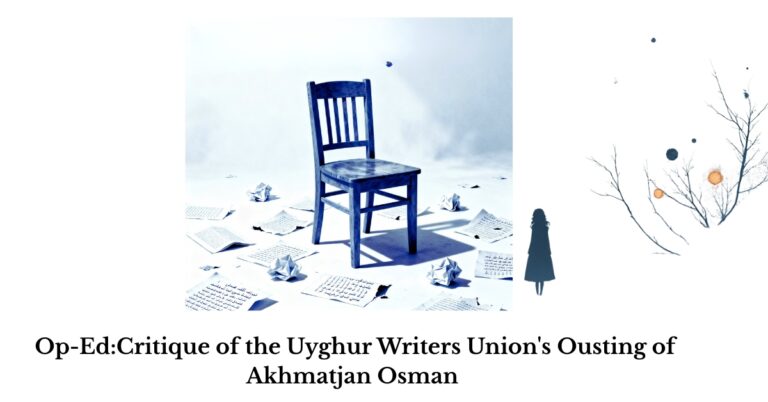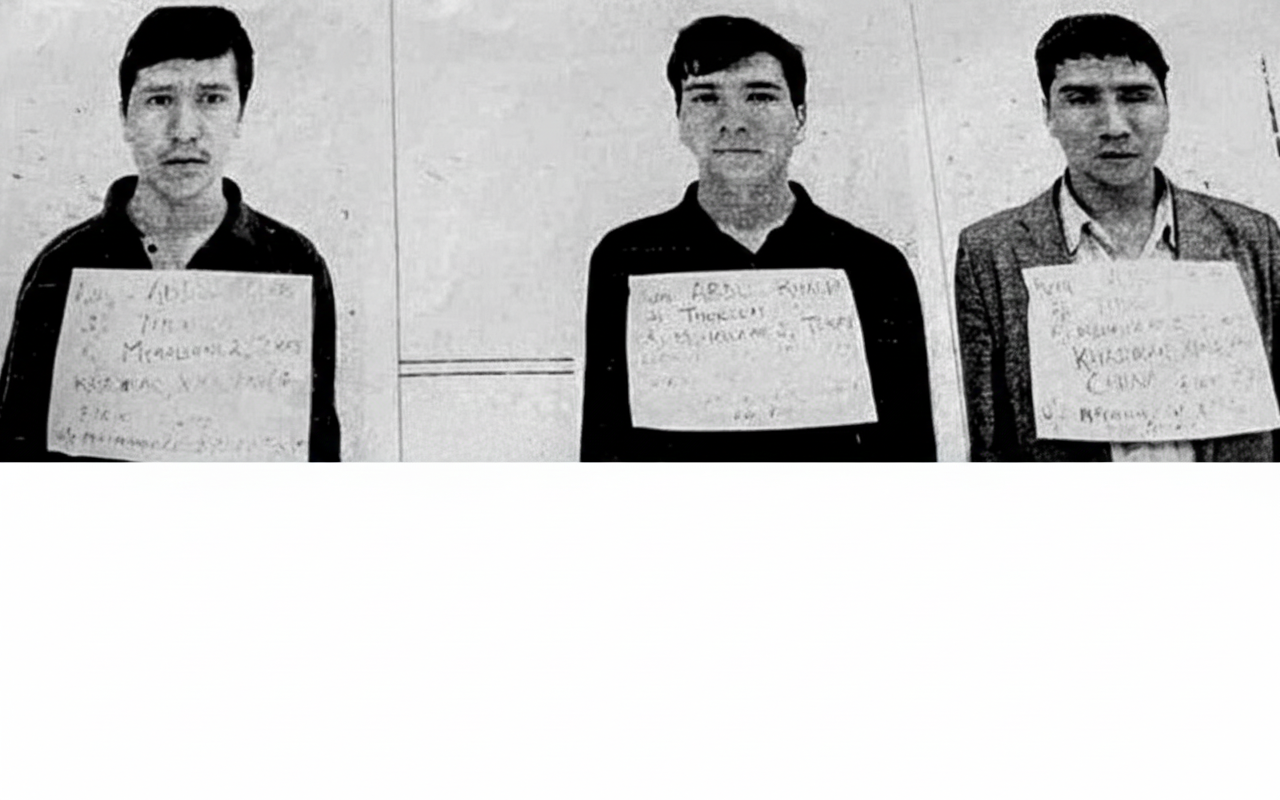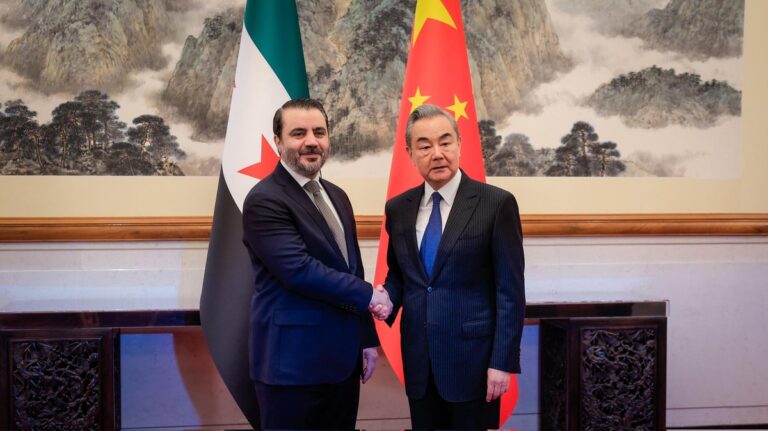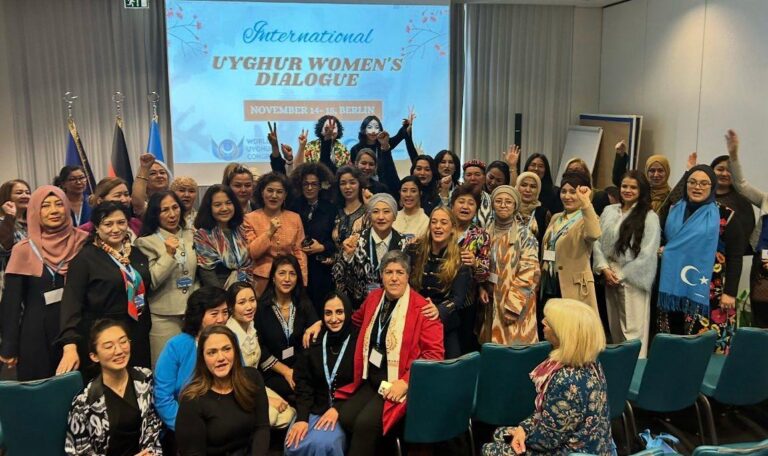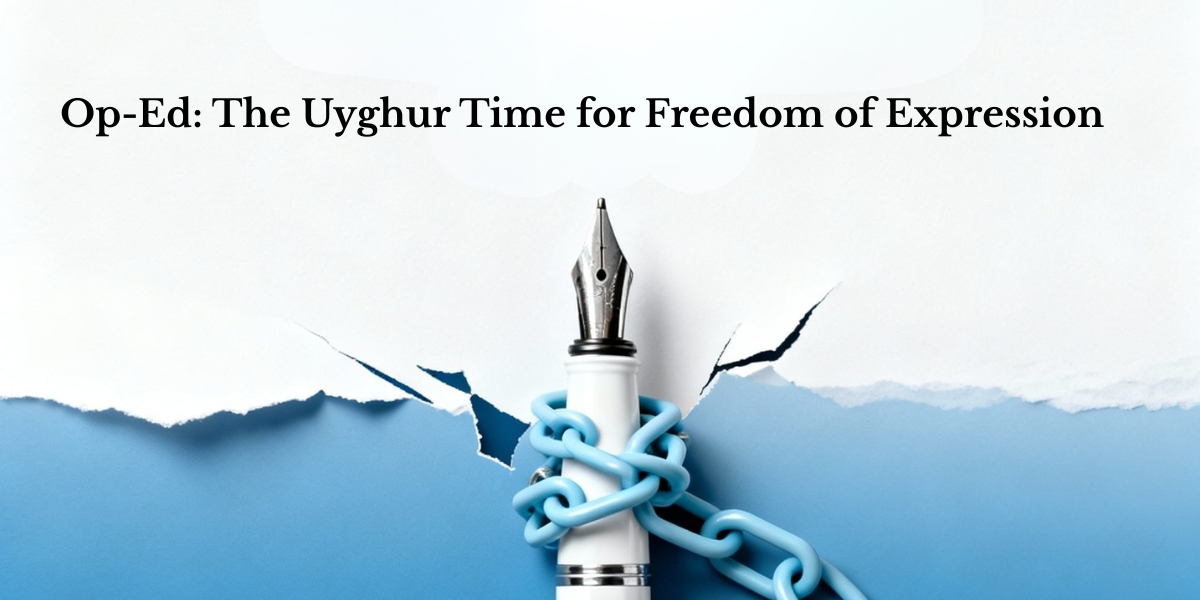
Op-Ed:The Uyghur Time for Freedom of Expression
Editorial Context for the “Alqissa” Controversy
Background: Prominent Uyghur poet Akhmatjan Osman, the former president of the World Uyghur Writers Union, was recently removed from his position following a strong online backlash. This controversy centered on his public statements and opinions regarding religious faiths, specifically his firm belief that Oghuz, a legendary figure in Turkic epics, should be considered a Uyghur prophet.
The organization’s decision to oust Mr. Osman has polarized the community, leading to diverse reactions:
- Some Islamic conservative figures and organizations have publicly supported his removal, viewing his opinions as contradictory to established “national faith”.
- Others have criticized the decision, defending his right to freedom of expression and intellectual debate.
To ensure a balanced discussion on this important matter of intellectual and national identity, we are publishing two separate opinion pieces that present contrasting views on Mr. Osman’s removal.
Please note: The views expressed in these opinion pieces are those of the respective authors and do not represent the official stance of Uyghur Times.
By Abduweli Ayup
Disclaimer: The views expressed in the commentaries are the author’s personal opinions and do not necessarily represent the institutional position of Uyghur Post. Uyghur Post’s opinion page provides a stage for unique (or different) viewpoints.
We Uyghurs believe that there is a right time for every deed and every word. Therefore, we emphasize doing things and speaking at the appropriate time. Well, is the content of “Alqissa” (The Tale), which the poet Akhmatjan Osman is reciting and which is being published on the World Uyghur Writers Union’s page, content that absolutely must be discussed during this time of genocide? What is the necessity of calling Oghuz Khan a prophet and the epic “Oghuz-name” a revelation or a divine decree, and promoting it now?
If it were possible to turn back time and return to the era of the Qarakhanids a thousand years ago, in that prosperous Kashgar, in the flourishing Turpan and Khotan, where one could toss wood into the fireplace and listen to the qissa (tale) in the long, cold, dark nights of winter out of idleness, it might have been much more enjoyable. However, in these days of the 21st century, when development is exploding and the very existence of the Uyghurs is challenged, when our hearts are restless, our minds troubled, and our souls branded, we need to listen to, sing, and line up for marches, not tales. Our duty—the one we must fulfill, or else be guilty, accursed, and hateful—is to escape the genocide and find a remedy for our agonizing situation. Since we are unable to change our state of agony, it is preferable that our thoughts, words, and actions are also appropriate for our state.
Reciting “Alqissa” is freedom of expression. We unconditionally respect all freedom of expression. However, being part of any organization, we abide by its charter in our words and actions; being part of a nation, we spare their feelings, respect their faith, and do not shatter their broken spirits. Spreading ideas that are contrary to the religion that the absolute majority of the nation believes in, as a chief of an organization and on an organizational platform, is nothing more than a mistake, irresponsibility, and immaturity.
Of course, it is possible that there are not a few people in the diaspora who think like Akhmatjan Osman. There are also many people who criticize Islam, doubt religion, and are skeptical of God, but they do not promote it. Even if they were to promote it, they would not be able to generate enough impact to disturb the Uyghurs. However, I believe that Akhmatjan Osman is able to weigh his own influence, and that he clearly knows what he is saying and the consequences of his words. Therefore, the expectation of Akhmatjan Osman was not to create a new prophet or a divine constitution for our people, but to explain and reveal the facts of the Uyghur genocide to the more than five hundred million Arabic-speaking people in the Arabic language in which he has gained fame by writing poetry.
To Akhmatjan Osman himself, I would say this: These things you are saying are neither new, nor necessary or appropriate today. They are things that have been spoken and written about among the Uyghurs for a thousand years. Even among the Arabs, they have been promoted and preached tirelessly for millennia. You know that there are even special movements and volumes upon volumes of books about them. Why do you need to tell us today about your ambition to create a new religion or your initiative to renew the Uyghur faith? There is blood flowing before us. Let us either take a bandage and bind it, or wrap it with gauze, or let us go look for a doctor! What are we doing?
What, then, should we do? In my opinion, as individuals, members of a nation whose existence is threatened have many concrete things they can do to save their language, their appearance, and their identity. For example, a friend’s son said, “Grow a beard, Dad!” When asked why, he replied, “You look like my grandfather in Turpan, whom I was born too late to see, and will never see.” What can we do for these grandchildren without grandfathers, and grandfathers without grandchildren? There is much we can do. We can certainly do our utmost to end this separation quickly, and to topple those who are destroying us. At the very least, we can make our beardless child a Uyghur, raise them to love their Uyghurness, and make them happy with our clear Uyghur appearance, by neatly growing the beard on our graying chin.
What is discussed in “Alqissa” has been echoing in the ears in Uyghur and Arabic for centuries. What has changed? Nothing! How many people followed the Arabs who narrated these things—like Al-Ma’arri, Mansur al-Hallaj—or followed our own Shah Mashrab and Gumnam (The Anonymous One), and how much change was achieved? No movement was created. What they said remained in poems, ghazals, and muqams, and life continued on its course. People continued to pray behind imams, to read Tarawih prayers in mosques, and to dance Sama at shrines. If that Mansur al-Hallaj, who proclaimed “Anal-Haq!” (I am the Truth/God), were alive, and if he were just a human, not a Uyghur, he would say “Uyghur Haq” (Uyghur is the Truth/Right) instead of “Anal-Haq.” He would be writing to preserve the language of today’s Uyghur, acting to protect their honor, and sacrificing his life to save their lives, for the righteous cause of the Uyghur people.
Like what is discussed in “Alqissa,” the doubts, assumptions, and judgments made about faiths throughout history, and the new movements that arose, only remained preserved in poems, diwans (collected works), and kulliyats (complete works). If those storytellers, assumers, and sages were alive today, and if they were just human beings, even if not Uyghur, they would not remain silent about the dark days we are seeing and the catastrophe we are facing. They would tell Akhmatjan Osman and his followers this: “O my devotees, I would support you, but now is not the time; it is inappropriate. Because a nation lies in its death throes right before my eyes, in its death throes!”
In a dying nation, being slaughtered by the hands of murderers, freedom of expression would appropriately be “holding a mourning ceremony,” “wailing,” “preparing for revenge,” and “offering comfort to the mourners.” We can wear whatever we want or not wear in our homes, but when we go out, on a day of death, on the calamitous days when our nation is in its death throes, we wear a doppa (cap) and tie on a white sash. The words we speak should also be fitting for the calamity, appropriate for the ceremony, and in tune with the people’s mournful feelings. Currently, all Uyghurs are dying, in pain, and in mourning. Even God is displeased with excessive talk, untimely speeches, ghazals that do not fit the muqam (musical mode), and tunes that resemble a flute player on such days.
The original article appeared in the Uyghur Post, a recently established Uyghur-language media outlet.
